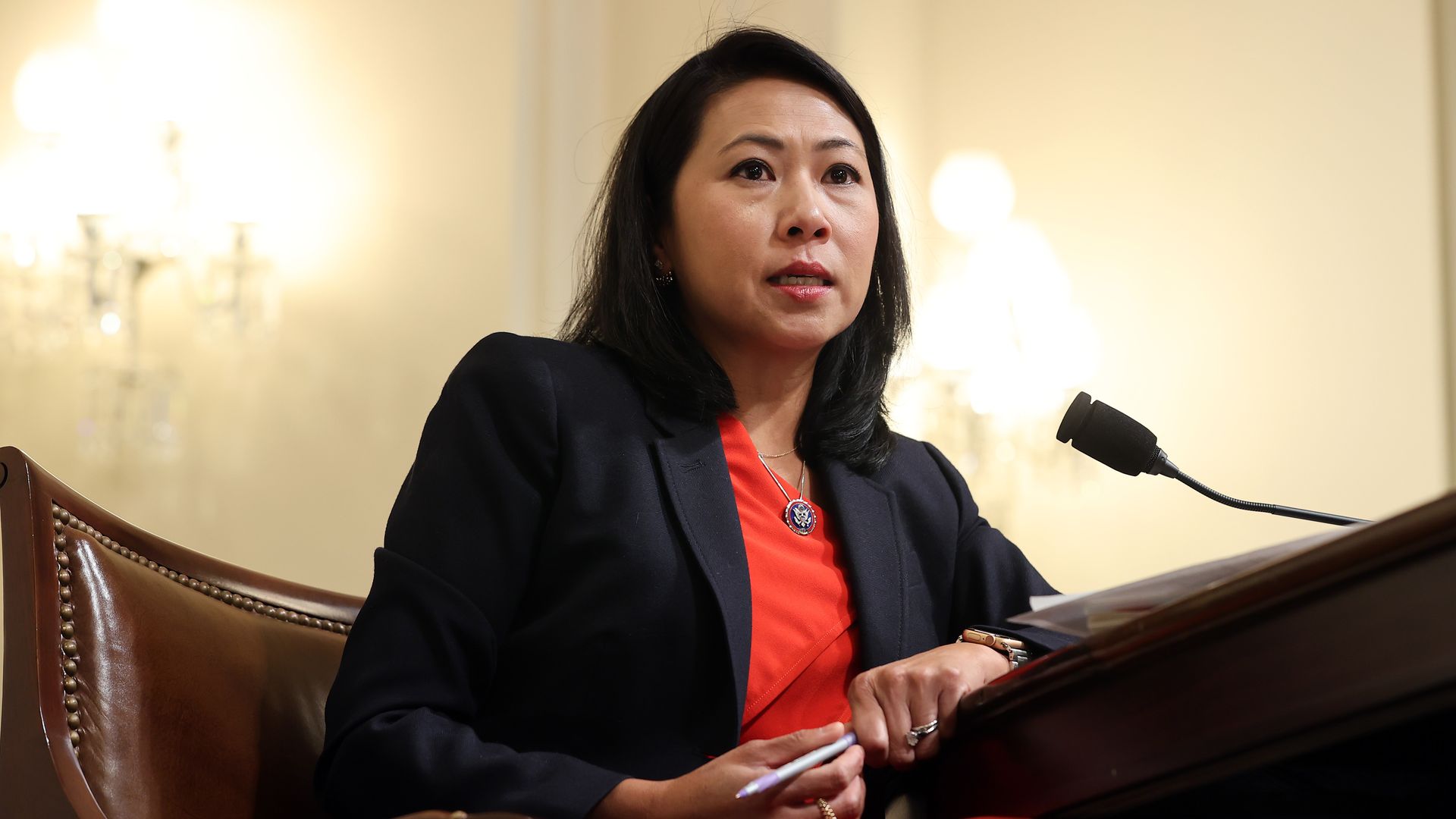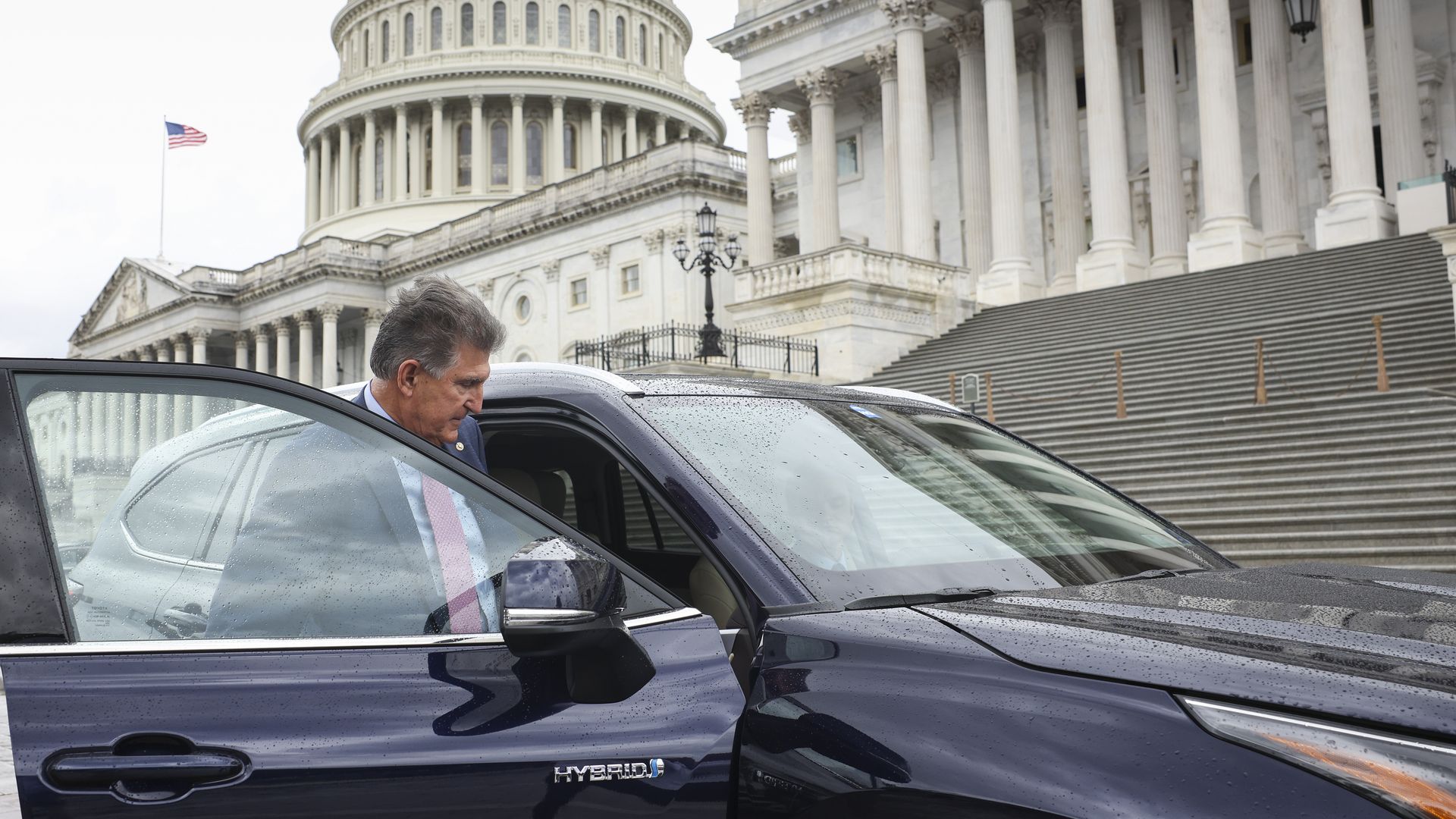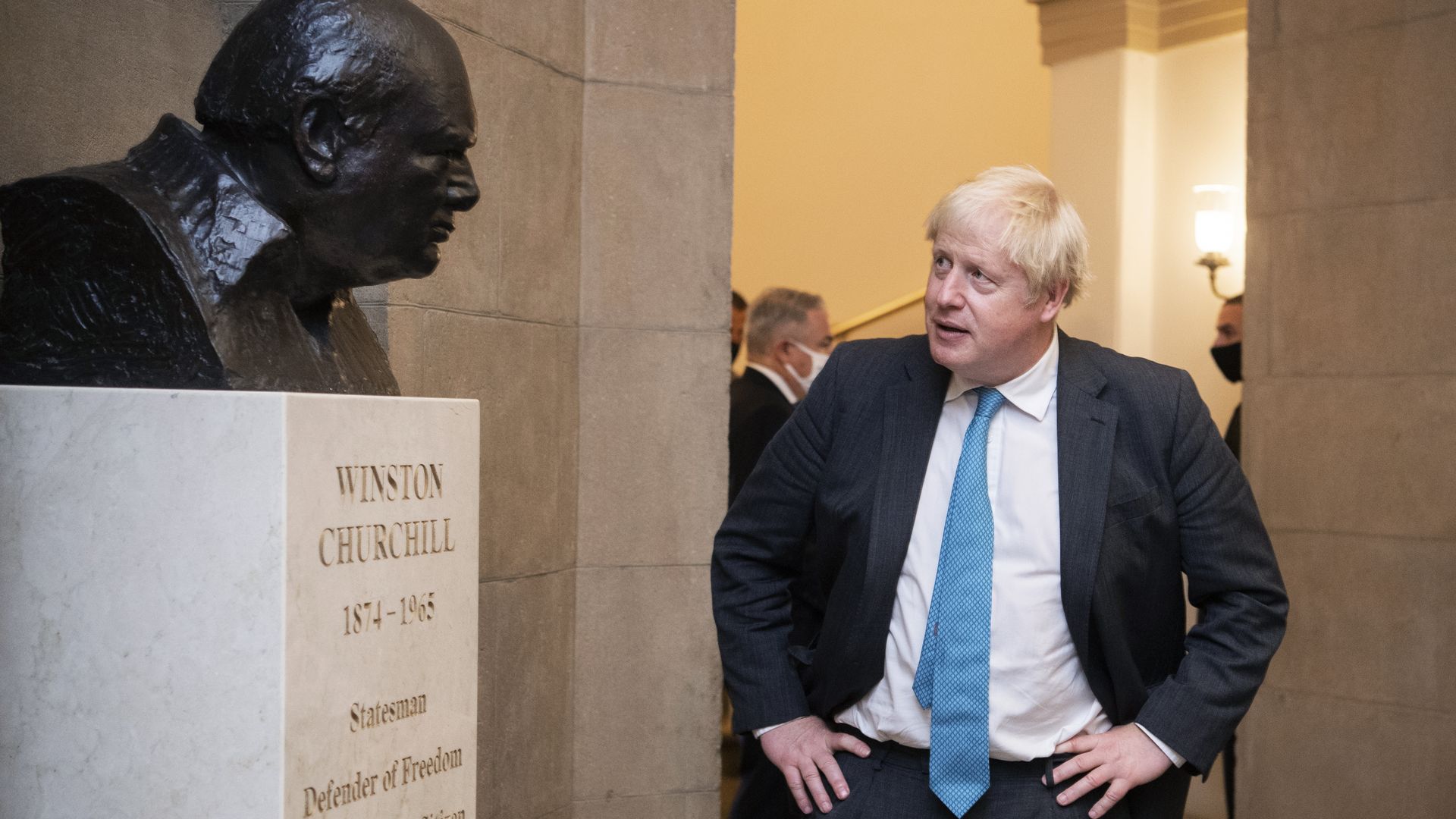| | | | | | | Presented By HCA Healthcare | | | | Axios Sneak Peek | | By the Axios Politics team ·Sep 22, 2021 | | Welcome back to Sneak. A president-by-way-of-the-Senate tried his best LBJ imitation to corral votes for his agenda. ♻️ Join Axios' Dan Primack and Niala Boodhoo tomorrow at 12:30pm ET for a virtual event about how venture capital funds and governments are investing in advanced climate tech. Guests include Sen. Ron Wyden (D-Ore.), chairman of the Senate Finance Committee, and Tom Steyer, co-founder of Galvanize Climate Solutions. Register. Smart Brevity™ count: 1,641 words ... 6 minutes. Edited by Glen Johnson. | | | | | | 1 big thing: Scoop - Dems seek new green deal |  | | | Rep. Stephanie Murphy. Photo: Chip Somodevilla/Getty Images/Bloomberg via Getty Images | | | | House Democrats discussed with President Biden today a plan to exempt billions of dollars of new climate spending from his requirement that his $3.5 trillion "soft" infrastructure plan be offset with additional revenue, Axios' Hans Nichols reports. Why it matters: The accounting proposal — a version of "dynamic scoring" — would dramatically lower the amount of taxes Democrats would need to raise while creating wiggle room to increase the ultimate size of the package. - The bill's final size will depend on two factors: How much in new taxes the centrists in both chambers can stomach, and how much creative math lawmakers are willing to use to justify the budget reconciliation bill's price tag.
- The maneuver under discussion has the potential to break a series of logjams involving progressives and centrists in the House and Senate.
What they're saying: "I'm a proponent for ensuring that the climate provisions within the reconciliation bill aren't subject to being paid for," said Rep. Stephanie Murphy (D-Fla.). - She was among the centrist lawmakers who met with Biden this afternoon.
- Murphy told Axios she "led" her White House remarks by suggesting that climate provisions should be exempt from "the president's desire to ensure that the entire bill is paid for."
- Democrats are arguing that the financial cost of inaction on climate will be so high — from paying for flood to forest fire recoveries — that they don't need to raise taxes to cover their green proposals.
The big picture: The Democrats' approach to climate spending is a version of the Republicans' argument that tax cuts pay for themselves, once economists factor in so-called dynamic scoring. - The theory is that any lost revenue from tax cuts is less than the higher overall tax receipts generated from a booming economy.
- The challenge is dynamic scoring rarely produces the amount of revenue advocates predict.
- Democrats long opposed the practice but embraced it to help justify the cost of the $1.2 trillion bipartisan infrastructure package that received both Republican and Democratic support in the Senate.
Keep reading. Go deeper: "Where the alarming economic damage stat in the new climate report came from" |     | | | | | | 2. Biden steps into the breach |  | | | Sen. Joe Manchin heads to a meeting with President Biden today. Photo: Kevin Dietsch/Getty Images | | | | Beyond Murphy, Biden ramped up the pressure on other Democrats today, calling a series of lawmakers to the White House in the hope of ending infighting and getting them in line, Hans and Axios' Alayna Treene and Sarah Mucha write. Why it matters: Divisions within the party are threatening to derail Biden's top priorities. After several weeks of letting negotiations play out, the president is finally asserting his power to ensure his own party doesn't block his agenda. - House Speaker Nancy Pelosi (D-Calif.) began her own endgame with her members yesterday, as Axios reported.
Driving the news: Biden met today with Pelosi and Senate Majority Leader Chuck Schumer (D-N.Y.), as well as key centrists and progressives in the House and Senate, during a series of three consecutive Oval Office meetings. - Each session offered a chance for the president to get everyone in one room at the same time to see where they could find common ground — a departure from the media posturing most players have used recently.
- Some Democrats have complained Biden should be more directly — and more forcefully — involved in pushing his $3.5 trillion budget reconciliation package across the finish line.
- The meetings offered him the opportunity to do just that.
- Some House Democrats also have been irked the president has spent so much time courting Senate Democrats and but not House members, even after passage of the companion $1.2 trillion bipartisan infrastructure bill.
What they're saying: Sen. Brian Schatz (D-Hawaii), who attended one session, told Axios: "The president has a calming effect on people. And, from my standpoint, the most important thing we can get out of this series of meetings is that people start to behave like adults again." - "The children have been fighting. Now Dad's gonna say, 'If you guys don't keep quiet, I'm going to turn this van around.'"
- Sen. Jon Tester (D-Mont.) told reporters: "[Biden] pretty much laid down where we're at. ... The fact is, we've got to have folks negotiate and talk and find common ground."
- As for timing on the infrastructure bills, Tester said: "I think he wants to get something by the first part of next week."
Be smart: Propelling the president and House and Senate leaders is that polling and midterm history raises doubts about how long Democrats will continue to control not just the White House but both the House and Senate. - Most Democrats, regardless of their faction, agree they must take advantage of it while they can.
Keep reading. Be smart: House Minority Leader Kevin McCarthy (R-Calif.) will address the Republican Jewish Coalition during their annual event in Las Vegas in November, Alayna reports. |     | | | | | | 3. By the numbers: Latino enclaves |  Data: Brookings Institution; Map: Thomas Oide/Axios A new census analysis shows the Hispanic or Latino population in the U.S. grew by 23% during the past decade — but some metro areas saw a population boom three or more times that rate, Axios' Stef Kight reports. Why it matters: It's Hispanic Heritage Month. The national population is changing, and the rapidly growing and more dispersed Latino populations come with important implications for U.S. politics. - While Democrats have typically enjoyed strong support among Latinos, there are signs some may be skewing Republican.
- And while counties with some of the most Latino representation tend to be in the Southwest, some of the fastest-growing Latino communities are in metro areas to the east.
By the numbers: In 1990, 2 in 5 Latinos lived in Los Angeles, New York, Miami and Chicago, writes Bill Frey of the Brookings Institution. - Now, about the same proportion are spread between those four metros, as well as Houston, Dallas and Riverside, California.
- All seven metro areas have more than 2 million Latino residents.
- But Latino communities are growing faster in areas that have smaller Latino populations to begin with — a sign of the demographics dispersing rather than congregating in a handful of cities.
|     | | | | | | A message from HCA Healthcare | | HCA Healthcare's commitment to advancing ethical standards | | |  | | | | This year, HCA Healthcare was recognized for the 11th time by Ethisphere as one of the World's Most Ethical Companies. Why it's important: Ethisphere is a global leader in defining and advancing ethical business practices. Learn more about how HCA Healthcare shows up. | | | | | | 4. The Stacey Abrams tour |  | | | Stacey Abrams appears on "Late Night with Seth Meyers" in May. Photo: NBC/NBCU Photo Bank via Getty Images | | | | Stacey Abrams this week launched an ambitious national tour that will stretch across months and many swing states ahead of the 2022 midterms — and potentially elevate her standing in the Democratic Party in the process, Axios' Alexi McCammond reports. Driving the news: Abrams kicked off the tour yesterday in San Antonio, where she told one local journalist "unequivocally, yes" she'd like to run for president one day. She was in Milwaukee tonight and will appear in Detroit tomorrow. The big question: Is the voting rights activist and former Georgia state lawmaker, once under consideration for President Biden's running mate, building to a rematch next year against Georgia Gov. Brian Kemp — or something bigger? - This week, she sent a fundraising email for Democrat Terry McAuliffe in his competitive Virginia gubernatorial race.
- Last week, she endorsed the Senate Democrats' Freedom to Vote Act — blessing the compromise driven by Sen. Joe Manchin (D-W.Va.).
- And though Abrams hasn't yet made an endorsement in a crowded Democratic primary for the U.S. Senate race in Wisconsin, her moderator for tonight's event in Milwaukee is Lt. Gov. Mandela Barnes, who's running.
How it works: Abrams has scheduled 12 stops across 10 states — Texas, Wisconsin, Michigan, Arizona, Colorado, Massachusetts, New York, Florida, Tennessee and North Carolina — through Nov. 20. - She announced her tour in August on Twitter, though it's gotten little national attention to date and modest early coverage from local reporters.
- These are paid events, with each venue determining the cost to attend and some offering a meet-and-greet option — though organizers said Abrams isn't taking the money. Profits go directly to the local theaters hosting them, and arts organizations they support.
- Moderators lead the conversation with Abrams around her work with voting rights, politics and social justice, as well as aspects of her personal life. Abrams' team invites local media, elected officials and entertainers to be moderators.
- Country singer Trisha Yearwood will moderate in Nashville. Writer Melissa Harris-Perry will moderate in North Carolina.
The backdrop: Abrams built national recognition through her closer-than-expected 2018 gubernatorial fight. She earned kudos for challenging Kemp, a Republican, in long-red Georgia. - Since then, Abrams has built a following around her voting rights activism and turnout efforts.
- She earned national acclaim and a huge chit with Biden and Senate Majority Leader Chuck Schumer (D-N.Y.) when she helped Democrats flip her state and take control of the presidency and the Senate.
Keep reading. |     | | | | | | 5. Biden heading back to Europe this fall |  | | | Marine One passes Windsor Castle as President Biden visited Queen Elizabeth II in June. Photo: Pool/Max Mumby/Getty Images | | | | The president plans to attend the G20 summit in Rome late next month before heading to the COP26 climate meeting in Glasgow, Scotland, people familiar with the matter tell Hans. Why it matters: Biden's European travels come at the time of some political strain. They'll also include his first Group of 20 summit with world leaders as president, with a host of thorny issues ranging from countering China's rise to coordinating a global response to COVID-19. - In June, Biden participated in a G7 summit in Cornwall, England, where he worked to convince other countries to adopt a unified approach to countering China's rising global influence.
- He has since angered France by secretly negotiating a nuclear submarine deal with the United Kingdom and Australia that led to the cancellation of a French contract for the vessels.
- A G20 gathering also includes the leaders of countries not necessarily allied with the United States — or Biden — on a range of issues, including China, Russia, Turkey, Saudi Arabia and Brazil.
Go deeper: The White House hinted at the trip in a statement today. - It announced the president would meet with French President Emmanuel Macron "in Europe at the end of October in order to reach shared understandings and maintain momentum in this process."
- After the Oct 30-31 summit in Rome, Biden plans to attend the climate conference in Glasgow during the first week of November.
Go deeper: "Jake Sullivan plans to visit Saudi Arabia, Egypt and UAE" |     | | | | | | 6. Pic du jour: Prime time |  | | | Photo: Tom Williams/CQ-Roll Call, Inc via Getty Images | | | | British Prime Minister Boris Johnson — a biographer of Sir Winston Churchill — surveys a bust of his predecessor while visiting the U.S. Capitol. |     | | | | | | A message from HCA Healthcare | | HCA Healthcare invests in high-tech clinical centers to advance care | | |  | | | | HCA Healthcare supports caregivers in many ways, including through their Centers for Clinical Advancement, which provide highly interactive, practice-based instruction. Why it's important: These innovative educational centers help improve colleagues' clinical skills and patient care. | | | | 📬 Thanks for reading. A reminder that your family, friends and colleagues can subscribe to Sneak or any of Axios' free newsletters through this link. |  | | It'll help you deliver employee communications more effectively. | | | | | | Axios thanks our partners for supporting our newsletters. If you're interested in advertising, learn more here.
Sponsorship has no influence on editorial content. Axios, 3100 Clarendon Blvd, Suite 1300, Arlington VA 22201 | | | You received this email because you signed up for newsletters from Axios.
Change your preferences or unsubscribe here. | | | Was this email forwarded to you?
Sign up now to get Axios in your inbox. | | | | Follow Axios on social media:    | | | | | |










No comments:
Post a Comment